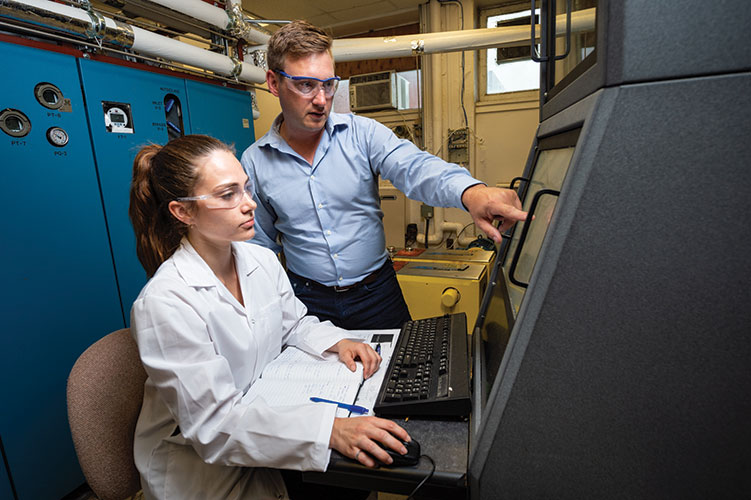Account Login
Don't have an account? Create One

Say “nuclear power” and what sometimes comes to mind is an image of big, cumbersome technology. But talk to the University of New Brunswick’s (UNB) Dr. Willy Cook, and a whole different picture emerges. “Nuclear is poised to be a major part of North America’s energy future,” he says. “The key is the small modular reactor (SMR). It’s a complete game changer.”
He should know. The professor of chemical engineering and Director of the Centre for Nuclear Energy Research (CNER) at UNB is one of the world’s leading experts on the technology. His and his team’s work helps the fight against climate change by developing SMRs for real-world applications that support renewable energy systems.
“SMRs can complement or replace current energy infrastructure because they are smaller, more flexible and more easily installed than conventional nuclear facilities,” explains Dr. Cook, who is an international specialist in corrosion control and steam-raising systems for nuclear power plants.
“Communities in the far north and remote locations are engaging with us because SMRs could replace their reliance on diesel-fired generators while providing significant opportunity for district heating. Heavy industry could benefit from SMR deployment for process heating that currently requires combustion of natural gas or heavy oil. The possibilities are enormous.”
Certainly, that hasn’t been lost on potential research partners who are similarly engaged in securing a cleaner, more reliable energy future. Last March, UNB and Bangor University in Wales signed a letter of intent to work together on developing SMRs for practical use. The letter, signed at the Canada-UK Nuclear Energy Summit, identifies possible areas of collaboration based on the similarities between the two leaders in nuclear research and development.
For UNB President Paul Mazerolle, that’s not only a great endorsement of Dr. Cook’s work – it means CNER is making a big difference in clean energy science. “Our researchers, like Dr. Cook, are confronting society’s most pressing issues head-on,” he says. “They are demonstrating the local, national and global impact of energy research being undertaken at UNB. We are creating the knowledge that’s urgently needed to tackle the great challenges of today and tomorrow in the field of energy. We are committed to contributing to this leading technology.”
In fact, UNB has had a dedicated nuclear research centre, working with both industry and academic institutions around the world on applied research projects, since 1992. In 2018, the New Brunswick government and leading SMR developers Moltex Energy and ARC Clean Energy Canada Inc. combined forces to create a $20-million R&D cluster centred in Saint John. CNER – which received $2 million for R&D and teaching activities from the cluster in 2019 – collaborates closely with Moltex and ARC to develop technology with increasingly innovative specifications.
“With the Point Lepreau Nuclear Generating Station, New Brunswick has long been a contributor to Canada’s nuclear supply chain,” Dr. Cook says. “Many of us equate nuclear power with large capital costs, licensing and engineering challenges, long lead times, cost overruns and the legacy of used fuel that remains radioactive long into the future. But SMRs are not the reactors we grew up with. It’s those very drawbacks that SMR developers are making great strides in addressing.”
Most importantly, he says, because SMRs require less on-site construction and shorter timelines before becoming operational, they can meet the rapidly accelerating energy needs of a world that’s both sensitive to the effects of climate change and cognizant of the variability of renewable energy sources.
“The fight against climate change represents the biggest economic and social challenge of our times,” Dr. Cook says. “But it could also represent one of our biggest economic opportunities. SMRs are non-carbon emitting power plants, and we need to see them in the big picture of nuclear energy in a carbon-free world.” •
Learn more about UNB’s research impact at unb.ca/researchimpact
Comment policy
Comments are moderated to ensure thoughtful and respectful conversations. First and last names will appear with each submission; anonymous comments and pseudonyms will not be permitted.
By submitting a comment, you accept that Atlantic Business Magazine has the right to reproduce and publish that comment in whole or in part, in any manner it chooses. Publication of a comment does not constitute endorsement of that comment. We reserve the right to close comments at any time.
Cancel